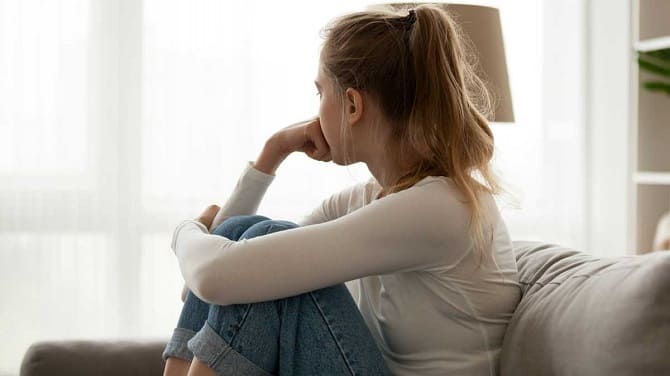No joy in life, don’t want anything: what is anhedonia and why do many people have it?
No desire to get out of bed, indifferent to the smell of coffee from your favorite coffee shop, no desire to travel, update your wardrobe, or meet with friends. Nothing brings joy. This is how those who experience apathy and depressive states describe their condition. However, there is a term that more narrowly describes the situation, not just a ‘desire to be inactive’, but specifically the ‘inability’ to experience pleasure. This is called anhedonia.
Anhedonia is a condition in which you lose the ability to feel joy and pleasure in life. When you no longer have any interest in ordinary things and activities that used to be satisfying. Anhedonia can be either temporary during a depressive period or a permanent companion, which can lead to major changes in your mental health.
In severe cases, anhedonia can be a symptom of a wide range of mental and physical disorders, such as depression, anxiety, schizophrenia, autism, drug addiction, and others. If you often feel emotionally empty and helpless, this is a sign of anhedonia. Treatment for anhedonia usually involves therapeutic methods – psychotherapy and even drug treatment, depending on the underlying diagnosis.
Causes that may contribute to the development of anhedonia
Anhedonia can be caused by a variety of factors, including:
- Psychological and psychiatric problems: Anhedonia may be associated with depression, anxiety disorders, psychosis, schizophrenia, and other mental health conditions.
- Physical problems: Certain medical conditions, such as chronic pain, thyroid problems, epilepsy, Parkinson’s disease, and others, can cause anhedonia.
- Medications: Some medications, such as antidepressants, antipsychotics, and some antihypertensive drugs, can cause anhedonia as a side effect.
- Social isolation: A lack of meaningful connections and support in society can lead to anhedonia.
- Trauma and stress: Life events, such as the loss of a loved one, divorce, extreme situations, can cause anhedonia.
- Negative beliefs and thinking: Negative beliefs about life and oneself can lead to a loss of interest and pleasure in life.
- Chemical dependencies: Studies have shown that anhedonia is often found in people with addictions (drugs, alcohol).
- Hypodynamia: There are also reports in several studies of a direct link between reduced physical activity and anhedonia. That is, the less you do, the less you want to do. Paradoxically, but true.
How to recognize anhedonia?
Anhedonia is a broad spectrum of disorders of hedonic function, including a reduction in motivation or ability to experience pleasure. Symptoms of anhedonia may include a loss of interest in activities that used to bring pleasure or a decrease in the ability to derive pleasure from usually enjoyable sensations .
If you notice symptoms of anhedonia, including the following:
- Loss of interest: You stop feeling joy and pleasure from things that used to please you. Perhaps you no longer have an interest in hobbies, meeting with friends, sports, and other previously enjoyable activities.
- Reduced emotional response: You find it difficult to express emotions or you feel emotionally flat, when the emotional response to events becomes weakened or completely absent.
- Worsening mood: You have had a consistently bad mood for a long time, which turns into depression. You feel sadness, despair, and hopelessness every day.
- Changes in behavior: Your lifestyle has changed. Instead of healthy eating habits, you allow yourself carbohydrate snacks, ignore full sleep, do not replenish energy, and avoid social communication. If your weight has significantly decreased, don’t be happy too soon, this is another symptom of anhedonia – lack of pleasure from food.
- Reduced motivation: You have lost enthusiasm and motivation to achieve goals or perform tasks that were previously important to you. You no longer see the stimulus and motivation, you don’t want to grow up the career ladder and wait for praise/bonuses from management.
Let’s speculate in more detail, why can you close yourself off from pleasure and eco-friendly enjoyment of life? Visual saturation and digitalization play an important role in this. Live a real life. Choose your surroundings carefully. Broaden your horizons. There are a lot of interesting things in the world. You just need to start learning what you don’t know yet, travel more, and just walk around the city, read, distract yourself from obsessive thoughts.
How to deal with anhedonia?
Dealing with anhedonia can be challenging, and it’s hard to know if something is wrong, especially if an emotionless attitude to life has already become a habit. However, there are a few strategies and approaches that can help you:
- Make changes to routine chores, dilute monotonous and tiring everyday life with new emotions — an art party, a bachelorette party, a quest, dancing. Try to bring novelty to your life. It can be a new hobby, a sports activity, meeting new people, or a little trip.
- Discover extreme destinations for yourself: skiing, parasailing, biking, surfing, snorkeling – everything that was previously available to you only in your dreams. Adrenaline will ignite new emotional possibilities in you. Maybe you didn’t even know what you were capable of.
- Perhaps the best solution will be drastic measures (if you are fearless and brave) – a change of job or even location. Full reset. The main thing in such a decision is not to replace the concepts of “anhedonia” and “running away from yourself or problems”.
- Prioritize physical health. A healthy lifestyle can help improve your mood and fight anhedonia. Pay attention not only to a healthy, but also to a beautiful diet (now it is a whole art), enough sleep (7 hours is already good), regular physical activity (not only the gym, but also walks) and stress management (if you are nervous or angry, learn to stop yourself in time, do not develop anger inside yourself).
- Find support from family, friends, colleagues, like-minded people – it is important when you are heard, understood and shared with the problem, the support of sympathizers has a good effect in the fight against anhedonia. It is possible that you may not be understood and attribute your weakness to spoiledness or laziness. The main thing here is not to aggravate the situation. Filter support correctly. It’s good if you enlist the support of people who are in a similar situation, but on the other hand, the two of you don’t “drown” even more.
- Take a closer look at art and creativity: painting and music can be an attempt to regain a lost sense of pleasure and rekindle creativity. Luckily, there are plenty of creative options to suit all budgets and tastes.
- Gradually return to activities that used to make you feel happy: it can take effort. But even if you’re not enthusiastic, try to start with small steps and make them part of your routine.
- If all else fails, seek help from a professional: a psychologist or psychiatrist will be able to assess your condition and offer appropriate help. If necessary, the doctor may prescribe medication or recommend psychotherapy.
It is always important to remember that anhedonia is a condition that should not be left unattended, and everyone has an individual path to a cure! However, don’t forget that pessimism is a mood, and optimism is a will. You create your own mood every day, and once you take responsibility for it, there is no question of anhedonia.

